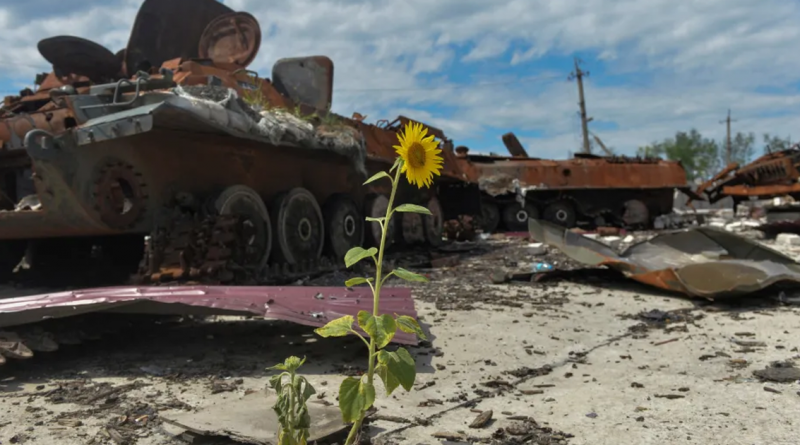The impact of the war in Ukraine on the European ecosystem
The full-scale invasion of Russia in Ukraine that began almost two years ago, has had a huge impact on the environment of not only Ukraine, but also many other European countries. Almost all components of the environment have been damaged. However, how significant is this damage and is it irreparable? Let’s find that out.
Missіles and drones in neighboring countries

Despite the fact that Ukraine was the only target of the Russian attack some of its neighboring countries have also been impacted by missiles and drones falling on their territory. According to an infographic study conducted by the Ministry of Environmental Protection and Natural Resources of Ukraine, during the first year and a half of the war:
- 3 missiles entered the airspace and 4 missiles fell in Moldova
- 2 missiles entered the airspace and 1 drone fell in Romania
- 1 rocket fell in Poland
In addition to the potential threat to biodiversity of the ecosystem, these attacks cause fires and pollute water and soil.
Water pollution
The Black Sea, which provides the countries of its basin (Ukraine, Romania, Turkey, Bulgaria, Georgia and Russia) with many types of fish, minerals and recreational activities, was also affected by the blowing of the Kakhovka Hydroelectric Power Station by a Russian projectile. Unfortunately, the European countries are going to be be the first to feel the impact, since the stream along the Ukrainian coast flows anticlockwise.

The head of the Ukrainian Scientific Center for Marine Ecology, Viktor Komorin, noted that the waters from the Kakhovska HPP carry « many pollutants » that will enter the Black Sea. These pollutants include toxic metals and petroleum hydrocarbons, which can cause severe consequences for the marine ecosystem. In addition, it is important to note that the streams of water, flowing into the sea are still. For the Black Sea, this will mean:
- Temporary desalination of water,
- Growth of algae and a drop in oxygen levels, and consequently death of fish populations
- Pollution by oil products, fertilizers, metals, and waste.
- Dispersion of mines over long distances
- Development of infectious diseases like cholera and botulism
Air pollution and contribution to global warming
One of the consequences of the war in Ukraine, which will have a huge impact not only on Europe, but also on the whole world, is the increase in carbon dioxide emissions into the atmosphere.
The air quality has become progressively worse due to the detonation of various types of ammunition and the use of artillery weapons, rockets, aerial bombs, as well as the fires in ecosystems, shells hitting oil depots and other industrial facilities. Data released from the Ministry of Environmental Protection and Natural Resources of Ukraine, state that 119.1 million tons of CO2 were emitted into the atmosphere due to the war in Ukraine. This is higher that the annual emissions in countries such as Romania, Austria, Norway and Sweden. This does not even take into consideration the overall level of gas contamination, which was high, even before the full-scale invasion.

Polluted air cannot remain only within the borders of Ukraine. Changes in the quality of the atmosphere have already been noticed in neighboring countries, in particular, Moldova. This was announced by the Minister of the Environment of Moldova, Yordanka-Rodika Yordanov at the international environmental forum « United for Nature. Agenda for Ukraine », which took place in October 2023. In addition, the statistics of the impact of various factors on global warming, which concerns not only Europe, but the whole world, makes it clear that the war on the territory of Ukraine has a significant impact on this ecological disaster: researchers estimate that the global military carbon footprint contribute to 5.5% of all greenhouse gas emissions. This value could be much higher, since massive militaries do not report on their emissions.
Why is it important to minimize the destruction of the environment?
Unfortunately, not all of the damage that has been done, nor the potential risks to the ecosystems of Europe can be prevented as the repercussions are more extensive than originally estimated. For example, in Croatia, the mines from the conflict which lasted from 1991 to 1995 have not yet been cleared and continue to claim victims. One of the last accidents of stepping on a mine happened in January 2023 – and it is almost 30 years after the occupation of the territories ended.
Ukraine plays a central role in ensuring food security in many countries thanks to the export of agricultural products such as corn, barley, wheat and sunflower oil. It is therefore obvious that if the disruption to the ecosystem is not minimised as much as possible, it could result in a significant food shortage for both Ukraine and Europe, in addition to the aforementioned environmental disaster.
How can we minimize the damage to the ecosystem?

In order to reduce the impact of the military action on the environment, it is worth following the example of countries that have already passed the stage of recovery after war. A vivid example is the countries of the Balkans, in particular Bosnia and Herzegovina, which were able to get back up thanks to the numerous European programs for the supply of materials, development of agriculture, and integration in Europe. Today, the most famous program to improve the environment is The Green Deal, which aims to make the European continent climate neutral by 2050. Ukraine could not only benefit from it, but also be an important part of the Deal. In the energy sector, Ukraine has the potential to become one of the future European hubs for the production of renewables. Furthermore at present, the Ukrainian electricity energy mix is one of the least CO2 containing mixes in Europe. Despite the war, Ukraine is potentially ready to export the cheaper electricity to the EU. The transition with the European Green Deal would solve two problems: air quality and the cost of electricity. Such a step during the war would help a faster recovery of the Ukrainian ecosystem as well as an improvement of the European ecosystem.
Conclusion
The full-scale invasion of Russia in Ukraine has not only caused a huge ecological crisis in Ukraine, but has also had a cross-border effect. It has already affected various sectors of the ecology of some European countries. A healthy and safe environment is one of the biggest values, known to humanity, but unfortunately it is being destroyed by the war. To protect this and other invaluable resources, humanity has to prevent wars and keep in mind that we have no future without our environment.
Sofiia MAKARUKHA / S5ENB / EEB1 Uccle




